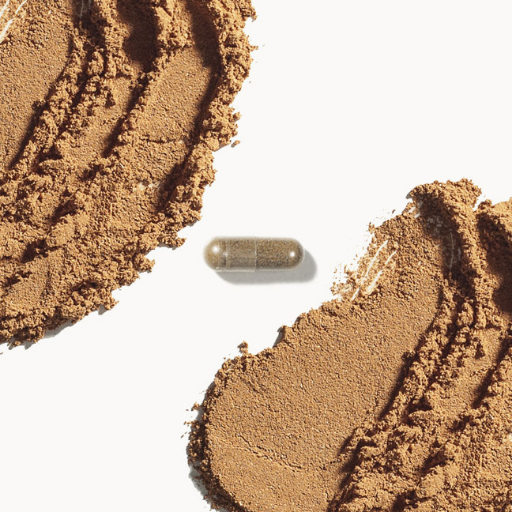Wellness Blog
The content on this blog is for general informational purposes only and is not a substitute for professional medical advice, diagnosis, or treatment. Always consult your healthcare provider before making changes to your health routine or taking new supplements.
Stress management with ginkgo and brahmi
The feeling of stressStress can come at any moment in a person's life. It is typically associated with a negative feeling of anxiety or frustration. In its most basic definition it is simply your reactive mechanism to a challenging or dangerous situation (1). It allows the human mind to decide whether to “fight or take flight.”Whilst short periods of stress in certain situations can be beneficial in allowing us to react appropriately to threatening situations, prolonged or constant stress may have negative effects on our health. Before going into how ginkgo and brahmi can help you with stress, let's learn more about stress itself.The science of stressTo better understand stress, we first have to get to know cortisol, a steroid hormone. Cortisol and stress are closely related. When stressed, a hormonal reaction tells your brain to adapt to a situation through a fight or flight mechanism. Through a combination of nerve and hormonal signals, this system prompts your adrenal glands, located at the top of your kidneys, to release a surge of hormones, including adrenaline and cortisol (2).Also known as the primary stress hormone, cortisol helps control the body's use of fats, proteins, and carbohydrates; suppresses inflammation; regulates blood pressure; increases blood sugar; and can also decrease bone formation. It also controls the sleep/wake cycle, giving you a boost of energy to better handle a stressful situation (3).Stress and health problemsA small amount of stress can lead to increased alertness, energy, and productivity. For example, an athlete playing in a sport gets a rush of adrenaline, allowing him or her to perform with higher levels of energy.However, repeated or prolonged exposure to stress can have detrimental effects physically and mentally. Too much cortisol may lead to weight gain (particularly around the abdomen and neck), fatigue, muscle weakness, and easily bruised skin, among other health issues (4).While we may not be able to control all the situations we face, there are some lifestyle changes we can make to counter uncontrollable stressors.4 Tips for dealing with stressHere are some ways to relieve day to day stress:Exercise and healthy habitsRegular physical activity reduces inflammation and the risk of insulin resistance. It also stimulates the release of growth factors—chemicals in the brain that affect the health of neurons, the growth of new blood vessels in the brain, and even the abundance and survival of new brain cells (5).Exercise also improves your mood and sleep quality, as well as reducing stress by increasing your endorphins (5). The production of endorphins during a workout is also why you can associate the feeling of good mood that you feel after a quality workout (5). Aside from exercise, lifestyle factors can significantly impact the way you deal with stress. Avoid unhealthy habits that can lead to more complications later on, such as too much caffeine, binge drinking alcohol, or smoking (6).Mental stimulationLike most other muscles in your body, regularly flexing and exercising your brain can help maintain its health (6). Mental stimulation helps form new connections between nerve cells and may even help the brain generate new cells, developing neurological "plasticity" (6). Staying sharp and maintaining strong brain health helps to fight off overbearing stress.Rest and relaxationRelaxation is a crucial tool in fighting work stress. There are several online resources you can find on deep breathing techniques, meditation, among many other relaxation techniques. Of course, regular exercise and a balanced diet have also been well-documented to aid in stress relief, but when it can not be avoided, you can also look to incorporate some natural herbal vitamins into your daily routine.DietCertain nutrients we take in may help us adapt better to stress. These include omega-3 fatty acids found in fish, which support brain function. Vegetables also contain many vitamins that can help your body deal with the harmful molecules produced by your body when under stress. These include vitamins A, E, C, zinc, and copper (7). Supplements like ginkgo and brahmi may also help you better adapt to stress.Ginkgo and brahmi as stress relief supplementsThe traditional brain herbs ginkgo and brahmi have been traditionally used in Chinese and Ayurvedic medicine to support good sleep and enhance brain health (8).Ginkgo and brahmi in supporting brain functionThe ginkgo leaf has been used medicinally for thousands of years and is one of the world's oldest living tree species (9). Also known as the brain herb, ginkgo is a powerful adaptogen that supports brain function, concentration, and memory recall (9).Brahmi is a common herb that is also used in traditional Ayurvedic medicine. It is renowned as a powerful brain tonic. The nerve tonic exerts nootropic activity to enhance cognitive performance (9).Ginkgo and brahmi in relieving stress and mild anxietyTogether, ginkgo and brahmi can support the relief of symptoms of stress and mild anxiety (9). Separate studies have found that ginkgo shows a similar effect to anxiety-relief medication (9). Brahmi, on the other hand, has been found to have mild anxiety reducing effects greater than what is found with a placebo. Brahmi also has adaptogenic effects by normalising the changes in the brain brought about by stress (9).Stress relief supplementsOne way to ensure you incorporate ginkgo and brahmi in your diet is through supplementation. The high dosage of Vitable Australia's combination of 3,000 mg for both herbs in our ginkgo and brahmi blend makes it a powerful formula to enhance the quality of memory and recall in everyday life.Using high quality plant extracts and gentle solvents, the ginkgo and brahmi extraction ensures that the supplement resembles the composition of the natural plant. The high dosage combination of both herbs makes it a powerful formula to support brain function and reduce stress.Enhance your body's adaptation to stress with a natural solution today. Opt for Ginko and Brahmi extract vitamin supplements by Vitable Australia. We offer a vitamin subscription box where you can create the best vitamin packs tailor-made for you. For your convenience, we also have a vitamin delivery service that delivers your package right to your doorstep!Find out more about other supplements that can support stress:Ashwagandha | Magnesium | B complex | Calcium Plus | Vitamin B12 | Ginkgo Brahmi*Always read the label. Follow the directions for use. If symptoms persist, talk to your health professional. Vitamin and/or mineral supplements should not replace a balanced diet.References: Health Direct. Stress. Health Direct. Published September 2019 on https://www.healthdirect.gov.au/stress. Accessed Dec 8, 2021. Mayo Clinic Staff. Chronic stress puts your health at risk. Mayo Clinic. Published July 8, 2021 on https://www.mayoclinic.org/healthy-lifestyle/stress-management/in-depth/stress/art-20046037. Accessed Dec 8, 2021. John Hopkins Medicine. Adrenal Glands. Published on https://www.hopkinsmedicine.org/health/conditions-and-diseases/adrenal-glands. Accessed Dec 8, 2021. Health Direct. The role of cortisol in the body. Published May 2020 on https://www.healthdirect.gov.au/the-role-of-cortisol-in-the-body. Accessed Dec 8, 2021. Harvard Health Publishing. Regular Exercise Changes the Brain to Improve Memory Thinking Skills. Published April 9, 2014 on https://www.health.harvard.edu/blog/regular-exercise-changes-brain-improve-memory-thinking-skills-201404097110. Accessed Dec 8, 2021. Harvard Health Publishing. 12 Ways to Keep Your Brain Young. Published Jan 29, 2020 on https://www.health.harvard.edu/mind-and-mood/12-ways-to-keep-your-brain-young. Accessed Dec 8, 2021. Campus Health. "Nutrition and Stress". The University of North Carolina at Chapel Hill. Published n.d. on https://campushealth.unc.edu/health-topic/nutrition-and-stress/. Accessed Dec 19, 2021. Vitable. Gingko and Brahmi. Published on https://www.get.vitable.com.au/products/ginkgo-brahmi. Accessed Dec 8, 2021. Vitable. Ginkgo & Brahmi. Vitable. Published n.d. on https://research.get.vitable.com.au/ginkgo-brahmi. Accessed Dec 19, 2021
Learn moreThe positive effects of ginkgo brahmi on hearing
Listening to music, watching movies, getting work done, and sharing stories with our loved ones are just some of our everyday activities that are made possible through our sense of hearing. If our sense of hearing is working the way it should, we can properly process our surroundings and react appropriately to audio stimuli. Alternatively, a compromised sense of hearing might make us prone to accidents, lessen opportunities for personal and professional fulfillment, frustrate us, and generally decrease our quality of life (1).There are several factors that can affect ear health and thus, our sense of hearing.This article can serve as a valuable reference if you have hearing related concerns on ways to improve hearing. If you are one of the many individuals dealing with issues like signs of hearing loss or a hearing impairment, read on to learn what you can do.First, learn about how the ear worksThe ear is composed of three main parts:The outer ear, the visible part of our ears, is where the process of hearing begins. The outer ear's shape is designed as such because its curved shape helps in locating sound waves. More so, the ear does not have a flat, creaseless surface mainly because its ridges and folds can trap debris that carry bacteria and subsequently cause infection (1).Next there is the middle ear that amplifies sound and carries it to the inner ear. Here, you find your eardrum and three small bones called ossicles (1).Finally, there is the inner ear that is in charge of converting sound waves into electrical impulses sent to our brain. It's here where sound begins its transformation from random audio stimuli from the environment to that which carries meaning and value to us (1).Together, these major anatomical components of our ears contribute to making hearing possible. Injury or damage in just one part of the ear may be enough to trigger the degradation of our sense of hearing often manifesting as hearing impairment or other signs of hearing loss. When these symptoms become noticeable and bothersome, you may be prompted to seek ways for how to improve hearing.The ear is a sensitive organThe ear is an extremely delicate structure, and can be negatively affected by factors such as aging, head trauma, a history of recurring infections, and even excessive exposure to loud noises (2). Signs of hearing loss are the most common health issues related to injured ears, but other offshoots of hearing impairment like vertigo and tinnitus can also occur (1).An estimate of 20% of Australian adults experience significant loss of hearing caused by various factors. We must also understand that even though we may have never injured our ears or gotten any kind of ear-related illness, the risk of hearing loss increases as part of the natural process of aging (2). Yet despite hearing loss being an inevitable part of life, we continue to pursue ways for how to improve hearing loss; we may not be able to prevent it from happening, but we may be able to delay, and perhaps even lessen the intensity of the condition, by following the ear health tips listed below.Adopting the right health habits for ear healthKeeping your ears healthy when you're young is one the best things you can do to prevent hearing impairment and other signs of hearing loss. Below, we suggest simple ways to avoid hearing-related issues, as well as how to improve hearing for those currently experiencing these problems. Definitely, avoid exposure to loud noise whenever possible. If your job or other activities you engage in make this unavoidable, always wear protective gear (3).You can also limit the use of earphones and headphones. Doing so lets your ears breathe (and thus avoid oil buildup while allowing moisture in the ears to evaporate, protecting you from the risk of bacterial growth and infection) (3). In relation to this, set up volume controls on your devices. This is so you don't risk ear injury from unexpectedly loud noises or sounds blasted by the apps or music players that you use. Always resist the temptation to scratch, dig into, or go poking around the ears to relieve an itch, clear them of wax or other obstructions, or for any other reason1. If you suspect that you need a thorough ear cleaning or that foreign objects have gotten lodged in your ear, go to a doctor for help.Lastly, a sure shot way on how to improve hearing, better your diet. Never forget that a well-balanced diet can do so much for ear health. Develop a diet that is mostly composed of fruits and vegetables, because vitamins and minerals like folate and potassium can decrease the risk of hearing loss (4).On top of an ear health-targeted diet, we suggest that you consider taking a ginkgo & brahmi supplement. These ancient herbs originally used in traditional Chinese and Indian medicinal systems have gained popularity for their ability to support hearing (5).How to improve hearing by taking Ginkgo & Brahmi supplementsStudies have shown that ginkgo and brahmi can help when supporting healthy hearing (6). These herbs are not commonly ingested raw in the diet, therefore, including them in your health regimen is one of the best ways to consume them (5). If you are looking for ways to improve your hearing and prevent hearing impairment, make sure to take care of your ears and see a healthcare professional should you experience anything out of the ordinary. Ginkgo & Brahmi supplements are available through Vitable Australia, a vitamin delivery service that lets customers build a vitamin subscription customised for their daily nutrition needs. These custom vitamin packs can be delivered straight to your doorstep, thanks to Vitable's convenient vitamin delivery service. Avail yours now!*Always read the label. Follow the directions for use. If symptoms persist, talk to your health professional. Vitamin and/or mineral supplements should not replace a balanced diet.References: Better Health Content Team. “Ears”. Better Health: Betterhealth.Vic.Gov.Au. Published on https://www.betterhealth.vic.gov.au/health/conditionsandtreatments/ears. Accessed January 24, 2022. Garvan Institute of Medical Research Content Team. “About hearing loss”. Garvan Institute of Medical Research: Garvan.Org.Au. Published on https://www.garvan.org.au/research/diseases/hearing-loss/about. Accessed January 24, 2022. Kids' Health Content Team. “Your Ears”. Kids' Health: Kidshealth.Org. Published on https://kidshealth.org/en/kids/ears.html. Accessed January 24, 2022. Hearing Health Foundation Content Team. “How nutrition affects our hearing”. Hearing Health Foundation: Hearinghealthfoundation.Org. Published August 14, 2018 on https://hearinghealthfoundation.org/blogs/how-nutrition-affects-our-hearing. Accessed January 24, 2022. Mayo Clinic Content Team. “Ginkgo”. Mayo Clinic: Mayoclinic.Org. Published November 18, 2020 on https://www.mayoclinic.org/drugs-supplements-ginkgo/art-20362032. Accessed January 24, 2022. Kumar, A., Raizada, R. M., & Chaturvedi, V. N. “Role of ginkgo biloba extract in acquired sensorineural hearing loss”. National Center for Biotechnology Information: Ncbi.Nlm.Nih.Gov. Published July 2000 on https://www.ncbi.nlm.nih.gov/pmc/articles/PMC3451083/. Accessed January 24, 2022.
Learn more





